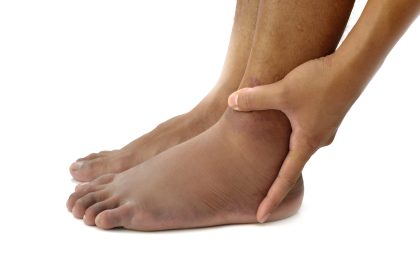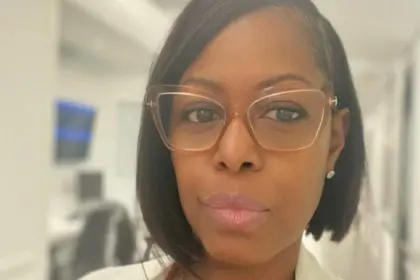
Cindy Milligan’s 31-year journey in healthcare began with a pivotal moment at age 12 when her grandmother suffered a stroke. Spending an entire summer in the hospital, young Cindy was captivated by the student nurses providing care. This experience sparked a passion that would shape her entire career, leading her to pursue health occupations in high school and eventually attend the same hospital-based nursing program where her grandmother had been treated.
Today, Milligan serves as a cardiac nurse practitioner at Piedmont Atlanta in Buckhead, specializing in advanced heart failure and transplant care. In a candid conversation with rolling out health IQ, she shares her remarkable journey and the challenges she’s overcome as an African American woman in healthcare.
What inspired you to pursue cardiac critical care nursing?
It rang to me when I was very young, I was 12. My paternal grandmother had a stroke when I was 12 years old, and she was in the hospital. I’ve spent all summer in the hospital with her, and so it was bittersweet to where I was introduced to the hospital setting at a very young age where she had the stroke, and she had student nurses.
So the hospital where she was at that summer, I actually that’s the only place I applied to go to nursing school or to go to college. It was probably a little risky, but that was what I wanted to do, is go to that same hospital based nursing program. They don’t even have those anymore. It was a diploma program.
So I applied to that nursing school, and I got in. My guidance counsel told me I would never get in, and I said, well, just watch, I will. I took health occupations in high school, and that, as they say, was kind of the rest of the story, and how my trajectory went in life.
How has your identity as an African American woman shaped your career?
It has not been easy in the beginning, in those first few years. I was very young when I graduated nursing school, I was 20, turning 21. So it was a little scary even in Charlotte in those days when I graduated in 1994 in December and started working in 1995.
There were times that I would walk in a room, and they would ask me, where’s my nurse? And I’m like, I am your nurse, and then there were some times that they did not want me as their nurse, because I was black.
Yes, so there were some times that as a young girl of 21 years old, it was some difficult days and so I would have to go tell my charge nurse, this patient does not want me as their nurse, because of the color of my skin. And those days there were some benefactors of the hospitals that gave a lot of money, and so my assignment would get changed, and so that was just how things were at that time.
It was a lot of days that it hurt my feelings, I cried because I didn’t quite understand how could someone be ill and then they’re at the mercy of someone that’s genuinely there to help, and they didn’t want that help. As time has gone on, of course, it’s happened many times over the years, but you learn to get a tough skin, and you learn to handle different situations.
What does your work involve as a cardiac critical care nurse practitioner?
As an advanced practice provider and nurse practitioner, we do transplants and heart failure. So when a patient comes in with heart failure, we are seeing patients of all ages, they can range from early twenties, all the way up to sixties and seventies.
When they land in the care of our team it is an end stage care situation, where we have to decide, is this patient a candidate for a surgical option? Which means, are they a candidate for a heart transplant, or are they a candidate for LVAD, which is a heart pump that will take the place of pumping the blood flow, that the heart is no longer able to do, or does the patient and the family want to just do what we call palliative care?
Our patient population is very vast, and I think we’ve seen a bigger impact of patients that are younger since Covid, because of the viral illnesses. Covid, RSV, Metapneumovirus, all these viral syndromes love the heart muscle, and they love the lungs and they have just really done a lot of damage to these organs.
That’s where I think we see a lot in the African American patient population, long-term hypertension. People have hypertension, they don’t even know it, that’s that silent killer that we talk about all the time.
What advice would you give to people of color interested in following your path?
I had a lot of cardiologists that I worked with back in Charlotte, even when I was in nursing school, and I graduated and ended up in the telemetry and the cardiac sector that took me under their wings. To this day I still have a lot of respect and communicate with them, anytime I need a recommendation for anything.
They’re African American cardiologists, and again, that’s a very small percentage that’s growing as well, too, but it’s still a small sector of our reach and our care teams, but they were very impactful even through my device and industry world.
My dad always told us, whatever you have in your mind, and whatever you learn, no one can ever take that from you. No one can ever tell you no, they may be able to tell you no, but you just keep striving, and you keep going.
So any nurse that I see, if they ask me, can you be my preceptor? And they’re a current nurse looking to, and they’re in nurse practitioner school, and they need preceptors, I always try my best to help or find someone to help them to fill their preceptorships, because it is hard. I always remember how hard it was to find preceptors when I was in school, and I always promised myself when I finish I will always make sure I will help whoever asks me.
Was the difficult path worth it?
A lot of times it is. It has been that, but I think it has definitely been worth it. I would not change one step of my path, or the blueprint, as I call it, of life. I would do it all over again, I think it’s definitely worth it.













